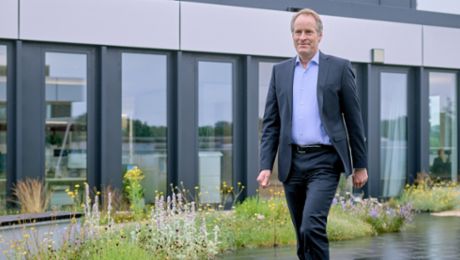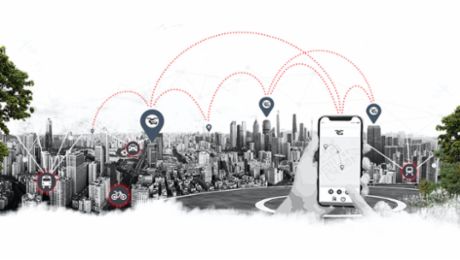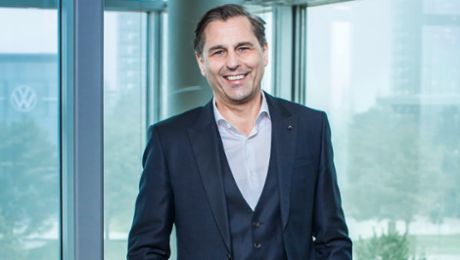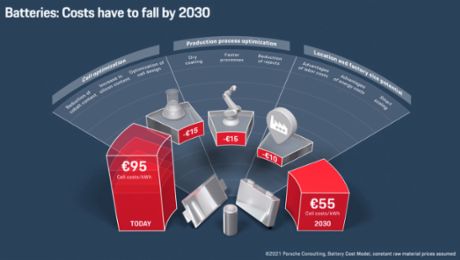The DKV Mobility Services Group combines a rich tradition with a future-oriented course. Founded more than 85 years ago, it has helped shape the European mobility sector in farsighted ways. Today it is Europe’s leading B2B mobility services provider, trusted by small enterprises and major trucking operations alike. Taxi companies, doctors’ offices, gardeners, and bakers—anyone using a van for their business or running an entire fleet of vehicles can benefit from DKV’s services.
DKV’s success is based on its vision of handling all of its customers’ mobility-related tasks so the latter are free to focus on their core areas of activity. The company’s transactions have increased to a volume of 9.3 billion euros in 2020. And it continues to pursue change on a systematic basis, reinventing itself with the aim of guiding its customers from the old to the new world of mobility—profitably and sustainably. In addition to the fuel cards that laid the foundation for its success, DKV’s business model is based on innovative and digital services for customers and on sustainable forms of mobility. The face of this change, and also its driving force, is CEO Marco van Kalleveen. A native of the Netherlands, he has headed DKV since 2019 and is responsible for maintaining the pace on the road to change.
Actively shaping change
“Improving companies—making them vibrant and successful—is what I love to do,” says van Kalleveen. And his record confirms his words. Since leaving McKinsey, van Kalleveen’s work has included guiding the transformation of portfolio companies for Bain Capital. He then strategically restructured the global department for domestic activities at the TNT Express international courier service. He now seeks to do the same with DKV.
Van Kalleveen is building the future of the mobility service provider on three pillars: growth in the core business area, a focus on innovations and digital solutions, and strong leadership in the field of renewable energies. In early 2019, Porsche Consulting helped lay the foundation on which these three pillars stand. “With their down-to-earth approach and profound insider expertise, the consultants were very helpful to us in building up our business operations,” says van Kalleveen. When he joined DKV in April of 2019—shortly after Porsche Consulting had finished the project—he lost no time in putting the management consultants’ proposals into practice. These included opening a production unit and utilizing a catalogue of potential sources of savings.
An important part of van Kalleveen’s growth strategy is to acquire additional business in Europe. DKV is already active in more than 40 countries on the continent and continues to expand its customer base and collaborative ventures in all areas. Its platform approach plays a key role here. The company uses partnerships to consolidate the services of different providers—including fuel station chains, toll collection companies, freight exchanges, and vehicle repair shops—and make them available to its customers, thereby overcoming barriers posed by international borders and language differences.
Overall service
The best example for this approach is how the DKV fuel card has evolved. This card lets holders pay without cash at more than 65,000 partner fuel stations, use the current number of approximately 185,000 charging stations, pay tolls for highways, bridges, and tunnels, and also pay parking fees. The transactions are compiled on an online portal that enables owners to manage their card limits and even download final statements for tax purposes.

The DKV card is the nexus for additional services—thanks in part to the new technical solutions that DKV is developing. For example, large shipping companies can provide cards to their drivers and also install the DKV BOX in their vehicles in order to pay tolls fully automatically in different European countries. DKV also offers a Europe-wide emergency service with referrals to partner workshops as well as country-specific assistance in handling bureaucratic matters. It supports customers in everything from pre-financing Belgium’s mineral oil rebates to putting France’s minimum wage into practice.
“We have more than 250,000 customers throughout Europe and more than five million users of our products and devices,” says van Kalleveen. “We also have a network of suppliers we can connect them with.” DKV is thereby unifying Europe’s fragmented mobility landscape and turning the company’s slogan of “You drive, we care” into a scalable business model that also attracts small and very small enterprises. Just like a large shipping company, a village baker also has vans that require fueling, parking, and bookkeeping—just in a different magnitude. As van Kalleveen explains, “We offer an overall service to our customers.”
Success from digital innovations
Since van Kalleveen joined the company, DKV has completely or partially acquired eleven companies in different countries—while continuing to expand its partnerships with fuel stations and charging networks. The acquisitions fall into two categories. Some are intended to gain specific regional expertise and skills and develop new customer groups. For example, in late May 2021 DKV strengthened its presence in eastern Europe by acquiring three providers of maintenance solutions for commercial fleets from Estonia, Lithuania, and Poland.
With the other category of acquisitions, van Kalleveen is pursuing his strategy of raising the level of digitalization in DKV’s product range. “Innovative uses of technology give rise to new business fields, and we are consistently ahead of the curve here,” he reports. One example is the acquisition in January 2020 of Styletronic, a leading provider of GPS and logistics management services from Austria. Thanks to Styletronic’s expertise, and in particular its real-time tracking of deliveries and fleets, DKV was able to bring DKV LIVE onto the market just eight months later. This system gives shipping companies a portal on which to view the locations of their vehicles at all times. DKV LIVE also calculates estimated delivery times based on drivers’ individual performance patterns—an absolute novelty in Europe’s logistics sector.
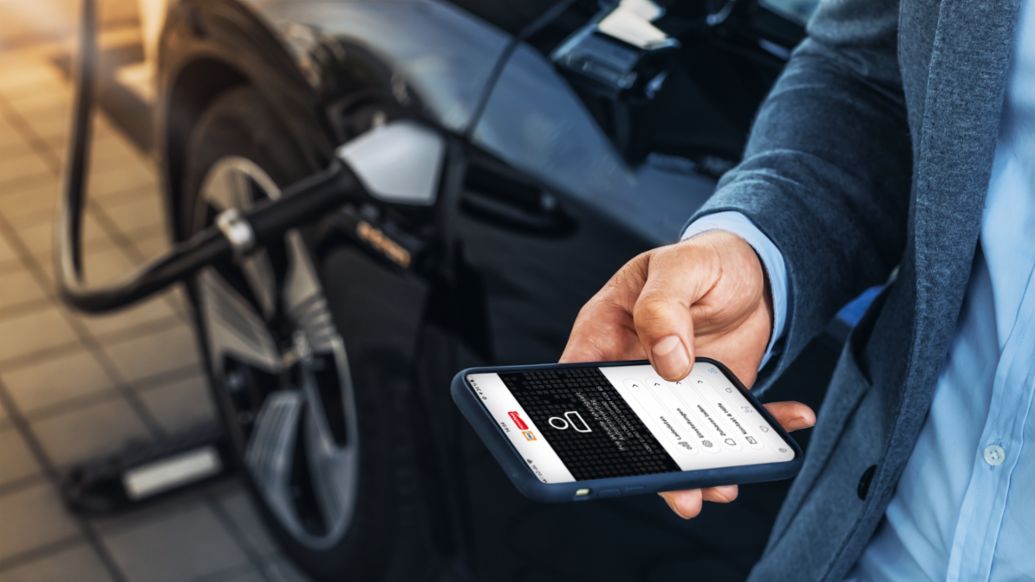
Smart and sustainable solutions
DKV LIVE also helps the company keep its promises about the environment. “We want to play a major role in facilitating the transition in mobility to a more efficient and sustainable future,” says van Kalleveen. “That’s why we’re trying to become the leading provider of sustainable services in our industry.” For example, DKV wants to help its customers reduce their CO₂ intensity by 30 percent by 2030. DKV LIVE helps by calculating the ideal route for each trip, which reduces the amount of fuel needed. The integrated digital freight exchange also helps by letting shipping companies see if additional cargo jobs are available along its routes and to promptly book them if so. This prevents empty and extra trips—and helps to further lower carbon emissions.
Moreover, DKV helps its customers switch to electric vehicles if they so desire. To do so, it founded the Charge4Europe joint venture with the Innogy e‑fuel provider, which offers access to a comprehensive network of charging points throughout Europe. Since late April 2021, this partnership has also included high-speed charging points at Total fuel stations in France, Germany, Belgium, and the Netherlands.
The shift in strategy is already showing positive results. Thanks to the larger customer base, new products, and corporate strategy, sales in 2020 grew by 10 percent. Van Kalleveen is excited about the future. “Germany has historically been our home and we continue to be very strong here. But we are also growing very fast in France, Italy, Austria, and eastern Europe.”
International structure
Marco van Kalleveen (52) became the CEO of DKV in April of 2019. Born in the Netherlands, he has worked in Chicago, San Francisco, London, and most recently Amsterdam, where he sharpened his specialist knowledge of the mobility and logistics sector as COO and board member of the LeasePlan leasing services provider (annual turnover: 10 billion euros). He was previously a board member with TNT Express and a partner with McKinsey, and also active with the Bain Capital investment firm. After studying business economics at Erasmus University in Rotterdam he earned an MBA from Harvard Business School.
Tradition and growth
Founded as Deutscher Kraftverkehr GmbH in Düsseldorf in 1934, DKV initially worked at the interface of transport by road and rail. Today, DKV is known throughout Europe for its fuel cards and its innovative services for vehicle fleets. Its customers range from large companies to very small delivery services. Medium-sized enterprises account for 80 percent of its business in the mobility sector. All signs at DKV are pointing toward growth. Its transactions in 2020 reached a volume of 9.3 billion euros, with around 1,200 employees at 15 international subsidiaries. The company is now seeking to help shape the sector Europe-wide and bring it onto a sustainable course with digital payment, invoicing, and navigation solutions for fleet management, fueling, toll payments, and electric mobility. Upon signing on to the United Nations Global Compact (UNGC)—the world's largest initiative for sustainable and socially responsible management—in December 2020, DKV declared sustainability one of its key aims and proceeded to integrate the ten universal sustainability principles for human rights, labor, the environment, and anti-corruption into its corporate strategy. It has also committed itself to attaining the EU's climate goals, and is planning to achieve a positive carbon footprint for its own activities by 2023.
Laying the foundations for transformation
DKV has grown continuously to meet rising demand ever since it was founded. But every branch of its business develops at its own pace, and synergies were not arising. Until 2019 the company did not have its own production unit that could function on a trans-divisional basis. Instead, the sales division handled the respective product management tasks. With the mobility sector changing faster than ever due to digitalization and new drive systems, it was necessary to adapt the company's internal structure to lay the foundation for further growth and create the conditions to enable flexible responses to future changes. "We needed someone with operational expertise who could help us set up a production unit," says Tobias Würz, who is now director core operations at DKV. "So we brought Porsche Consulting on board to initiate the transformation process." The management consultancy took on the job in early 2019 and completed the project just three months later. It focused on launching corporate change and identifying potential sources of savings.
Claus-Conrad Roth, a manager at Porsche Consulting, guided the project. "We analyzed cost blocks and weak points to achieve an efficient structure that meets the market's needs," he says. "We then used workshops to develop potential solutions and identify sources of savings together with the employees." Würz was especially impressed by the consultants' goal-oriented approach, remarking that Porsche Consulting invariably focused on the customer and wasted no time with superfluous questions.
Würz is thoroughly pleased with the solution. "Porsche Consulting laid the foundations for transforming the company. We followed up on identifying potential savings, and brought in 300,000 euros a year in the first round of negotiations with our contract partners." In 2020, DKV could then save a total of approximately half a million euros. Working with Porsche Consulting also made it possible to open a service center in Romania in the course of setting up the operational unit. As Würz explains, "We used to do everything from Ratingen. Porsche Consulting helped us to change our perspective—and that now functions on a sustainable basis."
Info
Text first published in Porsche Consulting Magazine.


